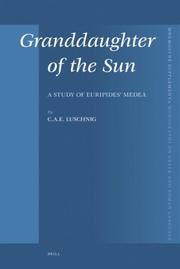| Listing 1 - 2 of 2 |
Sort by
|
Book
ISBN: 9781472527721 9781472530516 1472530519 1472527720 9781472530165 9781472533999 Year: 2014 Publisher: London [etc.] Bloomsbury Publishing
Abstract | Keywords | Export | Availability | Bookmark
 Loading...
Loading...Choose an application
- Reference Manager
- EndNote
- RefWorks (Direct export to RefWorks)
Euripides' Medea is one of the most often read, studied and performed of all Greek tragedies. A searingly cruel story of a woman's brutal revenge on a husband who has rejected her for a younger and richer bride, it is unusual among Greek dramas for its acute portrayal of female psychology. Medea can appear at once timeless and strikingly modern. Yet, the play is very much a product of the political and social world of fifth century Athens and an understanding of its original context, as well as a consideration of the responses of later ages, is crucial to appreciating this work and its legacy.
Euripides. --- Euripides, --- Medea (Euripides) --- Medea (Euripides).

ISBN: 9004160590 9789004160590 9786612397523 1282397524 9047420144 9789047420149 9781282397521 6612397527 Year: 2007 Volume: 286. Publisher: Leiden ; Boston : Brill,
Abstract | Keywords | Export | Availability | Bookmark
 Loading...
Loading...Choose an application
- Reference Manager
- EndNote
- RefWorks (Direct export to RefWorks)
This book attempts to view Medea in a positive light: looking not just at her failed relationships, but also at her successful ones and commenting on her intellect rather than just her clever manipulations of men. It tries to see her (or her author, who brings Medea home to Athens), as something of a political hero. The work considers the multiple facets of Medea, as the ideal wife, as a loving mother, as a woman among women, and how Medea becomes the author of her own story. The author asks what Medea is in the last scene: a demon or one of us; how she relates to the city-state; why this heroic drama is presented through the voices of two slaves.
Medea (Greek mythology). --- Euripides. --- Criticism and interpretation. --- Medea (Greek mythology) --- Medea (Greek mythology) in literature --- Médée (Mythologie grecque) dans la littérature --- Medea, --- In literature. --- Medea (Euripides). --- Euripides, --- Medea (Euripides) --- Euripides. - Medea - Criticism and interpretation. --- Euripide (0480-0406 av. J.-C.). Médée --- Critique et interprétation --- Euripides. - Medea --- Medea, consort of Aegeus, King of Athens (Mythological character) --- Euripide (0480-0406 av. J.-C.). Médée --- Critique et interprétation
| Listing 1 - 2 of 2 |
Sort by
|

 Search
Search Feedback
Feedback About UniCat
About UniCat  Help
Help News
News